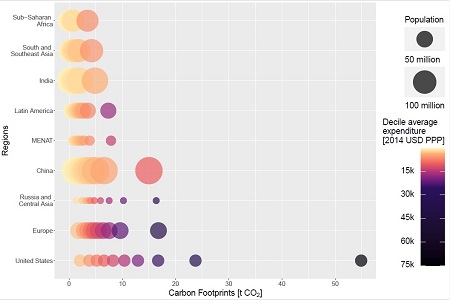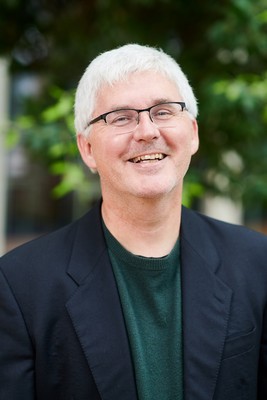Bestrijding armoede brengt klimaatdoelen niet in gevaar
Volgens de Duurzame Ontwikkelingsdoelen van de VN moeten er in 2030 ruim een miljard mensen minder in armoede leven. Als die doelen gehaald worden, zal het effect op de wereldwijde uitstoot van koolstof minimaal zijn. Dat klinkt goed, maar de reden hiervoor is de enorme ongelijkheid in de koolstof-voetafdruk tussen rijke en arme landen. Deze conclusies trekken onderzoekers van het Energy and Sustainability Research Institute van de RUG, samen met collega’s uit China en de VS. Dat doen ze op basis van een nieuwe dataset over consumptie en armoede die in samenwerking met de Wereldbank is geproduceerd. De resultaten zijn op 14 februari gepubliceerd in Nature Sustainability.
In 2015 formuleerde de VN haar ‘Sustainable Development Goals’ (duurzame ontwikkelingsdoelen) als een blauwdruk voor een betere, meer duurzame toekomst voor iedereen. In datzelfde jaar werd het klimaatakkoord van Parijs ondertekend, dat de opwarming van de aarde moet beperken. Maar een van de ontwikkelingsdoelen is om een einde te maken aan extreme armoede, en om de helft van de mensen die onder de nationale armoedegrens leven daar boven te brengen. Dit moet in 2030 gerealiseerd zijn. Dit zal gevolgen hebben voor de uitstoot van koolstof, maar hoeveel precies is nog niet nauwkeurig berekend.

Consumptie
Benedikt Bruckner is student aan de master Energy and Environmental Sciences aan de RUG. Hij bestudeerde de literatuur over dit onderwerp en concludeerde dat hij misschien een nauwkeuriger voorspelling kon doen. Zijn begeleiders, hoogleraar Wetenschap, Technologie en Maatschappij Klaus Hubacek en Research Fellow in de economie van klimaatverandering Yuli Shan hadden namelijk toegang tot een nieuwe, zeer gedetailleerde database over consumptie, die zij in samenwerking met de Wereldbank hebben opgezet. ‘Nog maar een klein deel ervan is nu toegankelijk voor iedereen, maar omdat wij er aan meewerkten hebben we toegang tot alle data’, legt Hubacek uit. De volledige Consumptie Database van de Wereldbank onderscheidt 201 verschillende uitgavencategorieën in 116 verschillende landen, waarin 90 procent van de wereldbevolking leeft.
Bruckner gebruikte de gegevens om nauwkeuriger dan ooit de koolstof-voetafdruk van de uitgaven door verschillende categorieën consumenten in deze landen te berekenen. Hij gebruikte ook de nationale armoedegrenzen in al die landen. ‘Daarmee kon ik berekenen wat het effect op de koolstofuitstoot is wanneer mensen van een uitgavenpatroon onder de armoede grens naar een categorie erboven gaan’, legt hij uit. De koolstofuitstoot is niet alleen in afzonderlijke landen berekend, Bruckner gebruikte ook een multiregionaal input-output model om emissies veroorzaakt in de wereldwijde productieketens in kaart te brengen.

Ongelijkheid
Op deze manier kon Bruckner er rekening mee houden dat wie in een rijk land de armoedegrens doorbreekt een grotere verandering veroorzaakt in de koolstof voetafdruk dan iemand die dat in een arm land doet. Zijn analyse laat zien dat wanneer een miljard mensen uit armoede komen, de wereldwijde koolstof uitstoot met 1,6 tot 2,1 procent zal stijgen. Shan plaatst een kanttekening: ‘Het is wel zo dat in landen met een laag en laag-gemiddeld inkomen, vooral in Afrika ten zuiden van de Sahara, de uitstoot zal verdubbelen door armoedebestrijding.’ Bruckner vult aan: ‘De reden voor de lage wereldwijde stijging is de enorme ongelijkheid in koolstofemissies.’ De totale uitstoot die de rijkste 1 procent van de wereld veroorzaakt is anderhalf keer die van de armste 50 procent.
Het goede nieuws is dat we ons geen zorgen hoeven te maken over een stijging in koolstofuitstoot door de bestrijding van armoede. Het slechte nieuws is dat een kleine minderheid van rijke mensen de meeste koolstof uitstoot waardoor de aarde opwarmt. Hubacek: ‘De gemiddelde Europeaan zorgt voor een uitstoot van ongeveer zes ton per jaar. Voor de meeste mensen die in armoede leven is dat minder dan een ton.’ Eerder werk uit zijn groep, en van anderen, laat zien dat een hoger inkomen zorgt voor een hogere consumptie van goederen en dus een hogere koolstofuitstoot.

Verantwoordelijkheid
Wat dit betekent is dat om de doelen van het akkoord van Parijs te halen de rijke landen hun consumptie van goederen moeten terugschroeven. ‘Minder consumeren is de enige optie’, zegt Hubacek. Het idee dat economische groei losgekoppeld kan worden van de koolstofuitstoot is volgens hem niet realistisch. ‘Slechts een paar van de rijkste landen zijn erin geslaagd die uitstoot los te koppelen voor koolstof. Maar er zijn ook andere grenzen die we niet over moeten, zoals verlies van biodiversiteit. Technologie alleen gaat daar niet voor zorgen.’ Bruckner: ‘Ons onderzoek laat zien dat de verantwoordelijkheid om koolstof emissies terug te dringen bij de rijke landen ligt. Wij moeten de armere landen de kans geven hun inwoners uit armoede te halen.’
Referentie: Benedikt Bruckner, Klaus Hubacek, Yuli Shan, Honglin Zhong, Kuishuang Feng: Impacts of Poverty Alleviation on National and Global Carbon Emissions. Nature Sustainability 14 February 2022
Meer nieuws
-
17 februari 2026
De lange zoektocht naar nieuwe fysica
-
10 februari 2026
Waarom slechts een klein aantal planeten geschikt is voor leven
